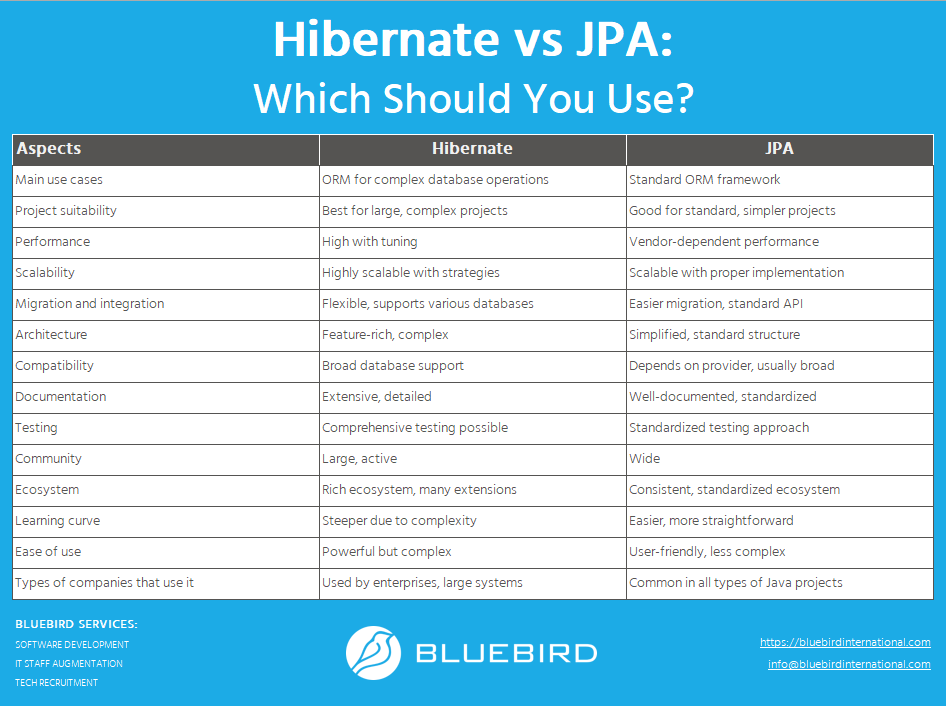Dive into our expert breakdown of Java Hibernate vs JPA. We help you understand which tool fits your project's needs for effective and efficient results.
More...
Databases are a crucial component of most applications. It's essential to have a reliable and efficient framework for working with databases. Two popular frameworks for this purpose are Java Hibernate and JPA. But which one to choose? Java Hibernate vs JPA.
Developers often find it challenging to choose between the two frameworks. Both provide a range of features and benefits, making it difficult to determine which one is the best fit for your project.
In this comprehensive guide, we will compare Java Hibernate and JPA. We'll explore their similarities, differences, and help you determine the right tool for your project. So, whether you're new to both frameworks or an experienced developer looking for a better solution, this guide will provide valuable insights into Java Hibernate vs JPA.
By the end of this guide, you will have a better understanding of both frameworks, their advantages and disadvantages, and when to use them.

Introduction to Java Hibernate and JPA
Before we move on to the comparison between Java Hibernate and JPA, let's briefly introduce both frameworks.
 | Java HibernateJava Hibernate is an open-source ORM framework used for mapping Java classes to database tables. Hibernate provides a high-level object-oriented query language (HQL) that allows developers to write database queries using object-oriented syntax instead of traditional SQL. Hibernate also handles the generation of SQL statements, which saves developers a lot of time and effort. With Hibernate, developers can perform CRUD (Create, Read, Update, Delete) operations on database entities using Java methods and annotations. Hibernate also provides caching mechanisms to improve performance and reduce the number of database queries. |
JPAJPA stands for Java Persistence API, which is a standard specification for ORM in Java. Similar to Hibernate, JPA allows developers to map Java classes to database tables, perform CRUD operations, and execute queries using object-oriented syntax. However, unlike Hibernate, JPA doesn't provide its own query language. Instead, JPA uses JPQL (Java Persistence Query Language), which is similar to HQL, but with some minor differences. JPA is part of the Java EE (Enterprise Edition) specification, which means it can be used in any Java EE compliant application server. By using JPA, developers can write database code that is portable across different database vendors, which makes it easier to switch to different databases without changing any code. |
Understanding Java Hibernate
Java Hibernate is an object-relational mapping (ORM) framework that simplifies database interactions by mapping Java objects to database tables. Hibernate provides a solution to the impediment of programming with relational databases. It handles this by easing the tasks of data connection, data modification, and retrieval by providing a layer of abstraction on the top of JDBC (Java Database Connectivity).
One of Hibernate's key advantages is that it eliminates the need to write complex SQL queries. This is because Hibernate provides an effective mechanism for defining object-oriented mappings between Java classes and database records. The mappings define how data is stored, accessed, and manipulated, allowing for easy object-oriented programming in Java.
Hibernate has a set of rich features that make it a popular choice for Java developers. One of its most significant features is its support for caching. Hibernate caches database queries and results in memory, which can significantly improve the performance of an application. Hibernate also provides support for lazy loading, allowing developers to avoid loading all data from a database at once, which can improve performance and reduce memory usage.
Another significant advantage of Hibernate is its support for transaction management. Hibernate provides a consistent programming model for transaction management, which makes it easier for developers to handle database transactions in their applications.
Overall, Java Hibernate is an excellent choice for developers who require advanced features and flexibility when working with databases. Its rich set of features, support for caching and transaction management, and ease of use make it a popular choice among Java developers.
Exploring JPA
In this section, we will examine JPA and its features in detail. JPA is a Java specification that defines a set of APIs for managing relational data and provides ORM support.
JPA is designed to simplify database interactions in Java applications. By providing a standard way to work with relational databases in Java, it eliminates the need for developers to write complex SQL queries and reduces the risk of errors.
JPA also offers a range of features, including:
- 1Entity Mapping: JPA allows developers to map Java objects to database tables through a set of annotations.
- 2Query Capabilities: JPA provides a powerful query language called JPQL (Java Persistence Query Language), which is similar to SQL.
- 3Transaction Management: JPA simplifies transaction handling by providing a set of APIs for managing transactions.
- 4Portability and Compatibility: JPA is designed to be portable across different databases and persistence providers, allowing developers to switch between different databases without changing their code.
Overall, JPA is a powerful and flexible framework that simplifies database interactions in Java applications. Its standardized APIs and portability make it a popular choice among developers.
Differences Between Java Hibernate and JPA
Java Hibernate and JPA are both popular tools for working with databases in Java, but there are key differences between them. In this section, we'll explore those differences in detail.
 | 1. ImplementationThe main difference of Java Hibernate vs JPA is how they are implemented. Hibernate is a specific implementation of the JPA specification, while JPA is a standard API that specifies how Java objects can be mapped to a relational database. This means that while JPA is a set of interfaces and annotations, Hibernate is a concrete implementation of those interfaces and annotations. |
 | 2. ArchitectureAnother difference is the architecture of the two frameworks. Java Hibernate uses a SessionFactory to create new sessions and manage database connections. JPA, on the other hand, uses an EntityManager to manage entity instances and manipulate data in the database. While both approaches are effective, Hibernate's SessionFactory provides more advanced features, such as the ability to create custom query languages. |
 | 3. CompatibilityJava Hibernate is compatible with a wider range of databases than JPA. Hibernate supports a variety of databases, including MySQL, Oracle, and PostgreSQL. JPA, on the other hand, is dependent on the database provider to implement the JPA specification correctly. This means that while most popular databases support JPA, there may be some limitations or differences in implementation that you need to be aware of. |
 | 4. Advanced FeaturesJava Hibernate provides more advanced features than JPA, such as support for caching, lazy loading, and custom query languages. Hibernate also has more flexible mapping options, which can be useful when working with complex data models. JPA, on the other hand, provides a simpler, standardized API that is easier to learn and use for basic CRUD operations. |
 | 5. Learning CurveJava Hibernate has a steeper learning curve than JPA, due to its more complex architecture and advanced features. Hibernate requires more configuration and setup than JPA, and can be overwhelming for developers who are new to ORM frameworks. JPA, on the other hand, has a simpler API and is more intuitive to use for basic operations. It also has more consistent behavior across different database providers, making it easier to work with in a multi-database environment. |
Conclusion
There are several differences between Java Hibernate and JPA, including implementation, architecture, compatibility, advanced features, and learning curve. Ultimately, the choice between the two frameworks depends on your project's specific requirements and your team's expertise. If you require advanced features and flexibility, Java Hibernate may be the better choice. On the other hand, if you prefer a simpler, standardized API and easier learning curve, JPA may be the better option.
Java Hibernate Vs JPA: Performance Comparison
Performance is a crucial aspect to consider when selecting a framework, as it directly impacts the efficiency and scalability of your application. In this section, we will compare the performance of Java Hibernate and JPA and help you determine which one would better suit your needs.
When evaluating the performance of Java Hibernate vs JPA, we mainly focus on factors such as query execution speed, memory usage, and scalability. It is important to note that the performance of both frameworks largely depends on the specific use case and its implementation.
Aspect | Java Hibernate | JPA |
|---|---|---|
Query Execution Speed | Java Hibernate has been known to have faster query execution speed due to its advanced caching mechanisms. Its second-level cache helps to minimize database round trips and improve performance significantly. | JPA has slower query execution speed compared to Java Hibernate. This is because it leverages a simpler caching mechanism which may increase the impact of database round trips and decrease performance. |
Memory Usage | JPA has slower query execution speed compared to Java Hibernate. This is because it leverages a simpler caching mechanism which may increase the impact of database round trips and decrease performance. | JPA uses less memory compared to Java Hibernate, making it ideal for applications with limited memory resources. However, proper memory management practices need to be in place to ensure optimal performance and prevent memory leaks. |
Scalability | Java Hibernate provides better scalability, especially for large applications. Its advanced features such as second-level caching, connection pooling and session management can help improve performance and scalability. Additionally, Hibernate leverages more advanced optimization techniques that can handle large datasets more efficiently. | JPA has less scalability compared to Java Hibernate. This is because it lacks some of the more advanced features that Hibernate offers, making it less suited for larger database applications with high concurrency. |
It is important to note that performance is not the only factor to consider when selecting a framework. Other aspects such as community support, learning curve, and ease of use are also critical determinants.
Hibernate Vs JPA: Community and Support
When it comes to community support, both Java Hibernate and JPA have active communities that provide assistance, resources, and documentation to developers.
Java Hibernate has been around for longer and has a larger community of users. As a result, it has a more extensive library of resources and a more active developer community. You can find documentation, tutorials, and support forums across the web, including on Stack Overflow and the official Hibernate website.

JPA, on the other hand, benefits from being a standardized specification. It has strong support from organizations like Oracle, who provide detailed documentation and examples on their website. Additionally, JPA is tightly integrated with Java EE, making it a popular choice in enterprise environments. You can find support for JPA on Oracle's website, the JPA specification website, and various online forums.
Java Hibernate | JPA |
|---|---|
Larger, more active community | Strong support from Oracle and Java EE |
Extensive library of resources | Tightly integrated with Java EE |
Online forums and documentation | Support from the JPA specification website |
Ultimately, the choice between Java Hibernate and JPA may come down to the level of community support you prefer. Both offer robust communities, but Java Hibernate may be a better choice if you need a larger library of resources and online forums. JPA, on the other hand, may be more suitable if you require strong support from Java EE and Oracle.
Learning Curve and Ease of Use
When it comes to choosing a framework, the learning curve and ease of use are essential factors to consider, especially if you are working under a tight deadline. Generally, Java Hibernate has a steeper learning curve than JPA. Hibernate requires more configuration and setup, which may prove challenging for beginners. However, Hibernate offers more advanced features and greater flexibility, making it an excellent option for complex applications where more control is needed.
On the other hand, JPA provides a more standardized approach to managing relational data in Java. JPA's API is relatively straightforward, making it easier to get started with, especially for beginners. Additionally, JPA's annotations simplify database mapping, making it easier to map Java objects to database tables.
That being said, both frameworks have extensive documentation, and there are numerous learning resources available online. When choosing between Java Hibernate and JPA, the ease of use and learning curve largely depend on your team's familiarity with the frameworks and the complexity of your project.

Use Cases: When to Choose Java Hibernate vs JPA
When it comes to choosing between Java Hibernate and JPA, the decision heavily depends on your project's specific requirements and use case. Both frameworks have their advantages and disadvantages, and understanding which one aligns best with your project can help you make an informed decision.
If your project requires more advanced features and flexibility, Java Hibernate is the way to go. It is suitable for complex projects that require a high level of customization and fine-grained control over database interactions. For instance, if you're working on an application that involves complex transactions, caching, or multi-tenancy, then Java Hibernate may be a better fit.
Alternatively, if your project follows industry standards and requires a standardized and portable solution, JPA could be the best option. JPA simplifies the development process by providing a set of APIs to manage relational data, and it is compatible with various databases, making it highly portable. This makes it ideal for small to medium-sized projects where agility and ease of use are critical.
- 1If you're working on a small web application that requires basic CRUD operations, JPA may be the right choice
- 2For projects that require compatibility with multiple databases or need to migrate databases frequently, JPA is the better option
- 3For complex projects that require a high level of customization and fine-grained control over the database layer, Java Hibernate is the better choice
- 4If you're working on a large enterprise system where scalability is a concern, Java Hibernate may be more suitable
Ultimately, the choice between Java Hibernate and JPA depends on a range of factors, including project requirements, performance considerations, community support, and developer expertise. By considering these factors and evaluating the strengths and weaknesses of each framework, you can make an informed decision that best suits your project's needs.
Migration and Integration
When considering migrating from Java Hibernate to JPA or vice versa, there are important considerations to keep in mind. Here are some factors to consider:
- 1Compatibility: Make sure both frameworks are compatible with your database management system.
- 2Codebase Impact: Migrating from one framework to another can have a significant impact on your codebase. It’s important to evaluate the amount of effort required to update your codebase and ensure that necessary changes won’t negatively impact your system’s performance or functionality.
- 3Regression Testing: After migrating, it’s important to perform regression testing to ensure all features are operating as expected and there are no regressions.
- 4Team Expertise: Consider the level of expertise among your team members. If your team is already familiar with one framework, it may be easier to stick with it rather than introducing a new framework.
Conclusion
After exploring the differences and similarities between Java Hibernate and JPA, it becomes clear that both frameworks offer powerful tools for working with databases in Java.
While Hibernate provides advanced features and flexibility, JPA offers a standardized and portable solution. When it comes to performance, Hibernate outperforms JPA in most cases, and its extensive feature set makes it a popular choice among experienced developers.
On the other hand, JPA provides a simpler and more straightforward approach to ORM, making it an ideal choice for less complex applications or those that require portability across different databases.

Which One to Choose?
The choice between Java Hibernate and JPA ultimately depends on your project's specific requirements, performance considerations, community support, and your team's familiarity with the frameworks.
To summarize, we recommend choosing Hibernate when you need more advanced features and flexibility, and JPA when you require a standardized and portable ORM solution.
By considering the factors discussed in this guide, you can make an informed decision that best suits your project's needs.
Other framework comparisons from Bluebird:
FAQ
What is the difference between Java Hibernate and JPA?
Java Hibernate is an object-relational mapping (ORM) framework, while JPA is a Java specification that defines a set of APIs for managing relational data and providing ORM support.
What are the key features of Java Hibernate?
Java Hibernate simplifies database operations by mapping Java objects to database tables, providing session management, transaction handling, and more.
What can I expect from JPA?
JPA offers a standard way to work with relational databases in Java, including entity mapping, query capabilities, and transaction management.
How do Java Hibernate vs JPA differ in terms of implementation and architecture?
Java Hibernate has its own implementation, while JPA is a specification that can be implemented by multiple frameworks. Java Hibernate is known for its more advanced features and flexibility, while JPA provides a standardized and portable solution.
Which framework offers better performance, Java Hibernate or JPA?
Performance can vary depending on specific use cases, but factors like query execution speed, resource usage, and scalability should be considered when evaluating the performance of Java Hibernate vs JPA.
What kind of community support is available for Java Hibernate and JPA?
Both Java Hibernate and JPA have active developer communities, documentation, and online forums that can provide assistance when working with these frameworks.
Which framework has a steeper learning curve, Java Hibernate or JPA?
The learning curve for Java Hibernate may be slightly steeper due to its advanced features, but both frameworks have extensive documentation and learning resources available.
When should I choose Java Hibernate or JPA for my project?
The choice between Java Hibernate and JPA depends on your project's specific requirements, scalability needs, and maintenance considerations. Use cases and project size can also play a role in determining which framework aligns better with your needs.
What are the considerations for migrating or integrating Java Hibernate and JPA?
If you plan to migrate or integrate Java Hibernate and JPA, you should consider challenges, best practices, and potential impact on your codebase. It's important to evaluate compatibility and ensure a smooth transition.